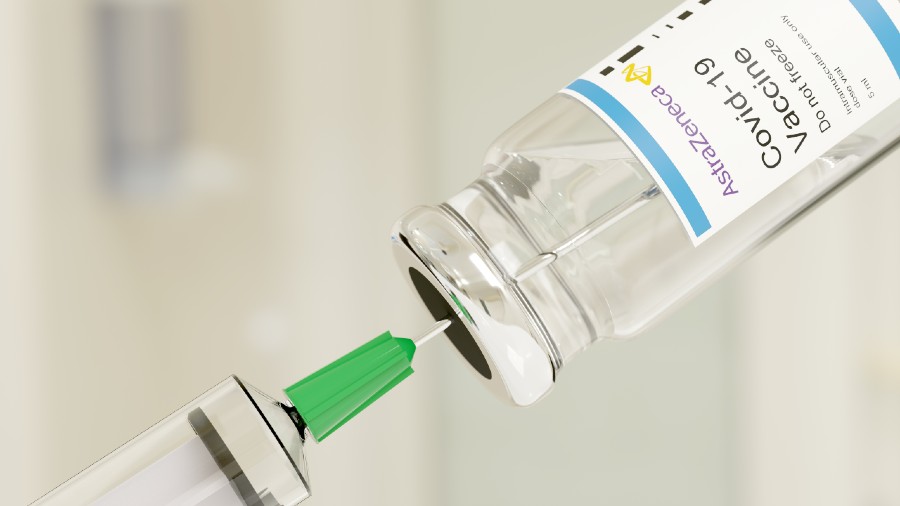Scientists at Oxford University have revealed the results of trials which show that people who have had two doses of the AztraZeneca vaccine have their immunity against Covid greatly enhanced if they are given a third booster jab.
The scientists found that the participants’ antibodies were “significantly higher” after the third injection compared to levels 28 days after their second doses.
The researchers detected higher levels of neutralising antibodies that protect against the Alpha variant and the Delta variant after the third jab, while T-cell responses were also boosted.
On Sunday, Oxford University began administering doses of a new Covid jab —called AZD2816 — that targets the Beta variant.
The university has partnered with AstraZeneca to give 2,250 participants in the UK, South Africa, Brazil and Poland the jab.
A separate trial of 90 Britons showed for the first time that the third dose “significantly” boosts antibody and T-cell counts, key indicators that the body is primed to defend against Covid. Two doses of the AstraZeneca jab “have been shown to reduce hospitalisations by more than 90 per cent against both the Indian and Kent variants”.
Participants were given a third AstraZeneca vaccine about eight months after they had received their second jab.
News of the trials comes a day after the BBC TV presenter Andrew Marr angrily protested live on air that he had contracted Covid despite having received both does of the vaccine.
Speaking to Peter Horby, who chairs the UK government’s New and Emerging Respiratory Virus Threats Advisory Group (Nervtag), Marr asked: “I hope it’s not self-indulgent to ask you about me, because I had a bit of Covid last week despite being double jabbed — and very nasty it was too.” He suggested he may have contracted the virus at the G7 summit in Cornwall earlier this month.
He suggested he may have contracted the virus while covering the G7 summit in Cornwall earlier this month.
Marr stressed: “I had been double jabbed earlier in the spring and felt, if not king of the world, at least almost entirely immune. And yet I got it. Was I just unlucky?”
Horby replied: “I think you were. So, although you were sick, you weren’t hospitalised and there wasn’t any fatality, and that is probably because of the vaccination.”
He told Marr: “It’s really important for people to realise that, as we increase the vaccination rates and most older people are vaccinated, we will see breakthrough infections. That does not mean that the vaccines don’t work — breakthroughs were expected. What we want to do is to prevent hospitalisations and deaths, and the vaccines do that very effectively.”
A booster jab, given six months after the second dose, is not yet government policy but it has not been ruled out.
Prof. Andrew Pollard, the lead researcher behind trials of the AstraZeneca vaccine at Oxford University, said sending the extra doses to developing countries where the most vulnerable are yet to receive any jab would be a better use of the UK’s supplies.
He raised the moral question: “To give third doses while other countries have zero doses is not acceptable.”
Dr Maheshi Ramasamy, principal investigator at the Oxford Vaccine Group, said: “The UK vaccine roll out programme has been incredibly successful at preventing hospitalisations and deaths, but we don’t know how long protection lasts.
“This study will provide evidence on whether further doses including ‘tweaks’ against new variants may be needed in the future.”
The final decision on a booster jab is one that will have to be ultimately taken by Boris Johnson’s government. Last week, the former health secretary, Matt Hancock, promised the government would set out plans for an autumn booster programme within the next few weeks.
Uganda’s president Yoweri Museveni added to the debate calling out “vaccine selfishness” in the world.
Museveni, who said Uganda was in the process of making its own Covid vaccine and only needed help with some raw materials, addressed delegates attending the regional World Health Summit in Kampala: “Africans are a disgrace to ourselves. Why do we have to depend on the outside for everything? This is a big shame for Africa.
“It is a shame the whole of the African continent is just asleep, waiting to be saved by others like it happened during the slave trade.”











